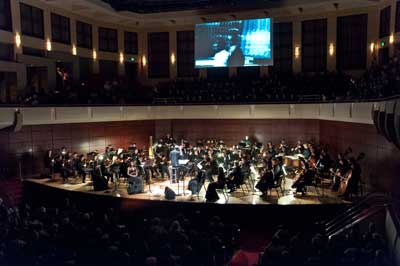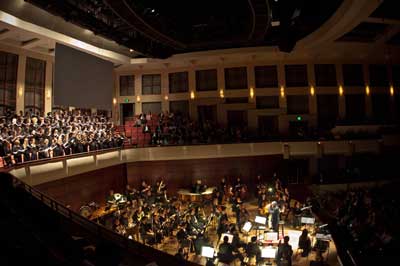Acclaimed composer Yotam Haber’s “A More Convenient Season” will receive its West Coast premiere with performances on Jan. 25 and 26 at the Roy and Edna Disney/CalArts Theater in Los Angeles.
 The engagement is co-produced by the University of Alabama at Birmingham’s Alys Stephens Performing Arts Center and The Herb Alpert School of Music at CalArts, and was commissioned by architect and philanthropist Tom Blount. The work will be performed by the CalArts Orchestra and Choral Ensemble under the direction of Mark Menzies.
The engagement is co-produced by the University of Alabama at Birmingham’s Alys Stephens Performing Arts Center and The Herb Alpert School of Music at CalArts, and was commissioned by architect and philanthropist Tom Blount. The work will be performed by the CalArts Orchestra and Choral Ensemble under the direction of Mark Menzies.
This is the first time an original work produced by the Alys Stephens Center will be developed and premiered in another city. This effort represents the realization of one of the ASC’s goals of creating innovative and meaningful artistic projects that expand beyond the region and engage audiences across the country. “A More Convenient Season” was written in commemoration of Birmingham’s civil rights struggle.
“From the time Tom Blount envisioned this project with composer Yotam Haber, he knew it was important for other communities to experience the music and be inspired by the commemorative work,” said Theresa Bruno, chair of the Alys Stephens Center’s Corporate Board.
The 70-minute, evening-length work also features a recorded soundscape by Philip White and oral histories from the Birmingham Civil Rights Institute, as well as a silent film featuring both new and archival footage shot in Birmingham by Academy Award-nominated director and filmmaker David Petersen.
Performances are scheduled for 8:30 p.m. Saturday, Jan. 25, and 3 p.m. Sunday, Jan. 26. Tickets are $25, with special ticket offers for REDCAT members and for students. For tickets, visit REDCAT online or call 213-237-2800. The ASC is organizing a group trip to Los Angeles for the performances. Call the ASC Development Office at 205-934-6196 for more information.
 Taking its title from a key phrase in the Rev. Martin Luther King Jr.’s seminal “Letter from the Birmingham City Jail,” Haber’s “A More Convenient Season” received its world premiere on Sept. 21, 2013, at the University of Alabama at Birmingham’s Alys Stephens Performing Arts Center, performed by the Alabama Symphony Orchestra under the direction of Michael Morgan, featuring young soloists and chorus members from 40 different choirs from across the region. The world premiere was also commissioned by architect and philanthropist Blount and co-produced by the Alys Stephens Center to memorialize the 50th anniversary of the September 1963 bombing of the 16th Street Baptist Church in Birmingham that killed four young girls — Addie Mae Collins, Cynthia Wesley, Carole Robertson and Denise McNair — an event that became a turning point in the civil rights movement. The work is being co-produced at REDCAT in Los Angeles by the Alys Stephens Performing Arts Center and The Herb Alpert School of Music at CalArts.
Taking its title from a key phrase in the Rev. Martin Luther King Jr.’s seminal “Letter from the Birmingham City Jail,” Haber’s “A More Convenient Season” received its world premiere on Sept. 21, 2013, at the University of Alabama at Birmingham’s Alys Stephens Performing Arts Center, performed by the Alabama Symphony Orchestra under the direction of Michael Morgan, featuring young soloists and chorus members from 40 different choirs from across the region. The world premiere was also commissioned by architect and philanthropist Blount and co-produced by the Alys Stephens Center to memorialize the 50th anniversary of the September 1963 bombing of the 16th Street Baptist Church in Birmingham that killed four young girls — Addie Mae Collins, Cynthia Wesley, Carole Robertson and Denise McNair — an event that became a turning point in the civil rights movement. The work is being co-produced at REDCAT in Los Angeles by the Alys Stephens Performing Arts Center and The Herb Alpert School of Music at CalArts.
After its premiere in Birmingham, Michael Huebner of The Birmingham News wrote, “With ‘A More Convenient Season,’ Yotam Haber has not only composed a monument to Birmingham’s civil rights legacy. He has made an important contribution to a larger body of works that focus on historic world events. ‘A More Convenient Season’ has enough staying power to appeal to a broader audience, to get across a ‘positive peace,’ so that the tragedies of the past — here or elsewhere — will not be repeated. Music, perhaps more than words alone, has that capacity.”
Haber, whose music has been called “deeply haunting” by Alex Ross in The New Yorker, says that “A More Convenient Season” falls between an oratorio and an opera. The work is composed in three movements: “Timing,” “Questions” and “Negative Peace/Positive Peace.”
“The dramatic arc to this work was conceived after spending time in Birmingham and speaking with a diverse cross section of the city’s citizens: young and old, black and white, Christians and Jews, people who were heroes and foot soldiers in the civil rights movement, as well as those who did not experience those years of turmoil,” Haber said. “From the beginning it was conceived not just as a piece for an orchestra to perform, but also as a work of public art. This is not an abstract work, open to any sort of interpretation; this piece is about something. But it is not only about the bombing of the 16th Street Baptist Church on September 15, 1963. If I had to pin down what that something is, I would say that this piece is dedicated to a question: ‘What do people do when faced with injustice?’”